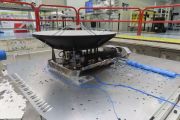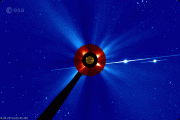
Copernical Team
Submissions open for Copernicus Masters 2022
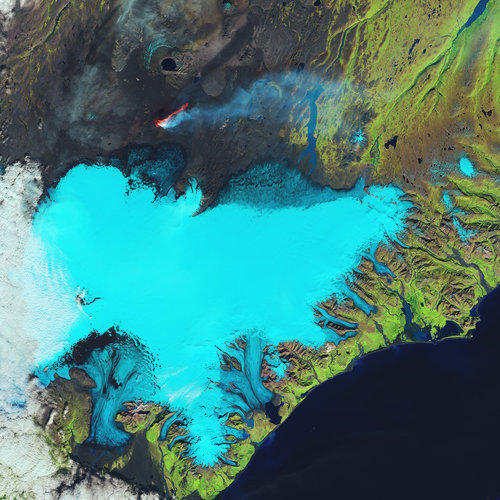
Submissions open for Copernicus Masters 2022
Checking in on the cameras of NASA's asteroids-bound Lucy spacecraft
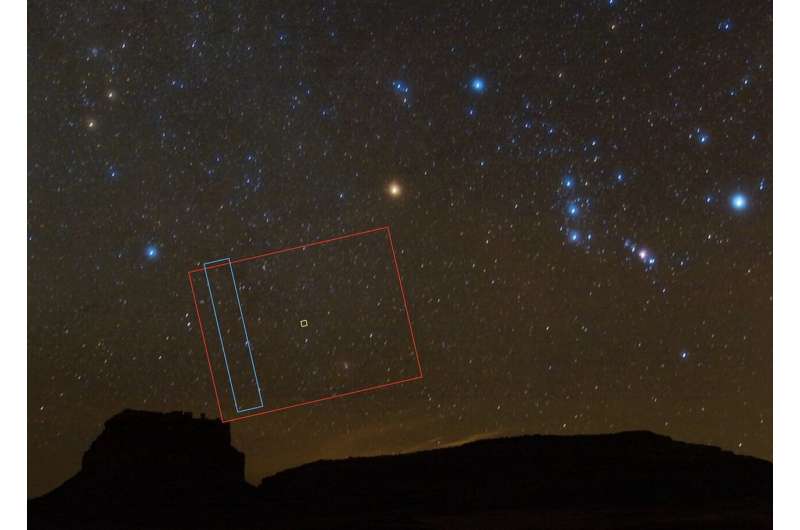
On Feb. 14, NASA's Lucy spacecraft, which is in the first few months of its journey to the Trojan asteroids, obtained a series of calibration images with its four visible-light cameras.
Chinese satellite ground station receives Landsat-9 data
 The China Remote Sensing Satellite Ground Station has formally acquired the capability to receive, process and distribute the data product transmitted from the Landsat-9 satellite, according to the Aerospace Information Research Institute, Chinese Academy of Sciences.
The station has received data from the Landsat-5 since 1986. It also provides Landsat-7 and Landsat-8 observation data for
The China Remote Sensing Satellite Ground Station has formally acquired the capability to receive, process and distribute the data product transmitted from the Landsat-9 satellite, according to the Aerospace Information Research Institute, Chinese Academy of Sciences.
The station has received data from the Landsat-5 since 1986. It also provides Landsat-7 and Landsat-8 observation data for First-of-its-kind detection of reduced human CO2 emissions
 For the first time, researchers have spotted short-term, regional fluctuations in atmospheric carbon dioxide (CO2) across the globe due to emissions from human activities.
Using a combination of NASA satellites and atmospheric modeling, the scientists performed a first-of-its-kind detection of human CO2 emissions changes. The new study uses data from NASA's Orbiting Carbon Observatory-2 (O
For the first time, researchers have spotted short-term, regional fluctuations in atmospheric carbon dioxide (CO2) across the globe due to emissions from human activities.
Using a combination of NASA satellites and atmospheric modeling, the scientists performed a first-of-its-kind detection of human CO2 emissions changes. The new study uses data from NASA's Orbiting Carbon Observatory-2 (O 17-year Neptune study reveals surprising temperature changes
 The heating-and-cooling changes of Neptune's atmospheric and global temperatures have caught the attention of the astronomers who have monitored them over 17 years, a study released Monday shows.
The expert international team spent nearly two decades keeping a close watch on the gaseous planet's temperatures using ground-based telescopes, including the European Southern Observatory's Ve
The heating-and-cooling changes of Neptune's atmospheric and global temperatures have caught the attention of the astronomers who have monitored them over 17 years, a study released Monday shows.
The expert international team spent nearly two decades keeping a close watch on the gaseous planet's temperatures using ground-based telescopes, including the European Southern Observatory's Ve L3Harris awarded $117M space object-tracking modernization contract
 L3Harris Technologies (NYSE:LHX) has been awarded $117 million for option-year three of a U.S. Space Force and U.S. Space Command contract to continue maintaining and modernizing infrastructure to track objects in space. The Maintenance Of Space Situational Awareness Integrated Capabilities (MOSSAIC) program has an estimated contract value of $1.2 billion over 10 years.
L3Harris won the in
L3Harris Technologies (NYSE:LHX) has been awarded $117 million for option-year three of a U.S. Space Force and U.S. Space Command contract to continue maintaining and modernizing infrastructure to track objects in space. The Maintenance Of Space Situational Awareness Integrated Capabilities (MOSSAIC) program has an estimated contract value of $1.2 billion over 10 years.
L3Harris won the in NASA working around valve issue to complete testing of Artemis
 NASA on Tuesday plans to proceed with modified pre-launch tests of its next mega moon rocket, the Space Launch System.
The tests have been delayed due to a valve issue with the rocket's upper stage, agency officials said Monday, but they will be working around it - by not fully fueling the rocket - in order to finish the tests.
Issues with the rocket's helium pressure system --
NASA on Tuesday plans to proceed with modified pre-launch tests of its next mega moon rocket, the Space Launch System.
The tests have been delayed due to a valve issue with the rocket's upper stage, agency officials said Monday, but they will be working around it - by not fully fueling the rocket - in order to finish the tests.
Issues with the rocket's helium pressure system -- Most distant galaxy candidate yet
 An international astronomer team has discovered the most distant galaxy candidate to date, named HD1, which is about 13.5 billion light-years away. This discovery implies that bright systems like HD1 existed as early as 300 million years after the Big Bang. This galaxy candidate is one of the targets of the James Webb Space Telescope launched late last year. If observations with the James Webb S
An international astronomer team has discovered the most distant galaxy candidate to date, named HD1, which is about 13.5 billion light-years away. This discovery implies that bright systems like HD1 existed as early as 300 million years after the Big Bang. This galaxy candidate is one of the targets of the James Webb Space Telescope launched late last year. If observations with the James Webb S How scientists analyzed the aerodynamic characteristics of the Tianwen-1 Mars parachute
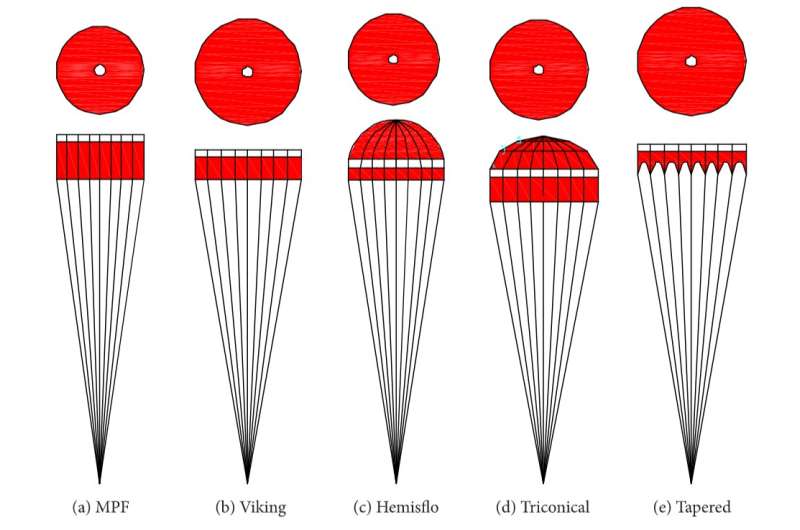
3D-printed bone for emergency medicine in space
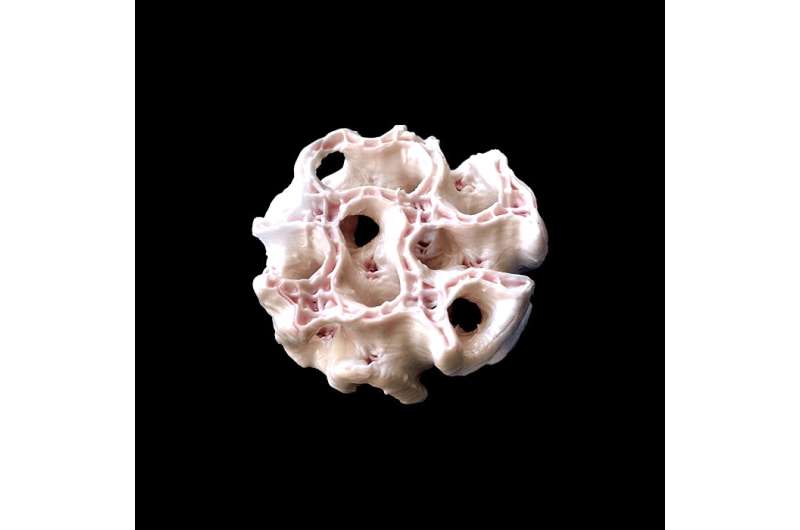
This artificial bone sample is an early step towards making 3D bioprinting a practical tool for emergency medicine in space. An ESA R&D effort aims to develop bioprinting techniques capable of giving astronauts on an extended mission ready access to the "spare parts" needed for bone or skin grafts, and even complete internal organs.
3D bioprinting may soon be practical on Earth, and could help meet the challenging conditions of spaceflight. Astronauts in zero or low gravity lose bone density, for example, so fractures may be more likely in orbit or on Mars.
Or, treating a burn often involves a graft of skin taken from a patient's body—manageable on Earth with full hospital care but more risky in space, as the secondary damage may not heal easily.
Skin or bone can be bioprinted using a nutrient-rich "bio-ink" of human blood plasma, available from the astronauts themselves. By working upside down—in "minus 1g" gravity—the team has shown they can probably do it in space.
This bone sample is part of the first selection of items on the 99 Objects of ESA ESTEC website, a set of intriguing, often surprising artifacts helping tell the story of more than half a century of activity at ESA's technical heart.


